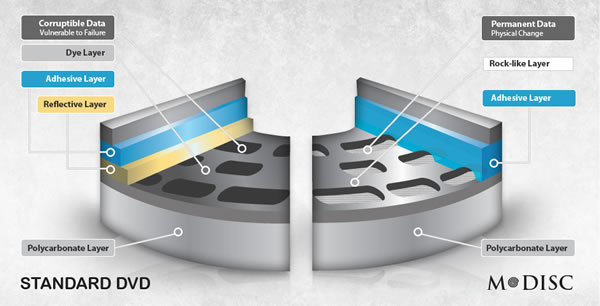LG and Millenniata, a new startup, plan to launch a new storage format with optical discs that far exceed the average life expectancy of your average optical disc, hard drive, flash storage -- or human for that matter. Whereas conventional storage mediums have an average lifespan of six months to eight years depending on the technology, data stored on LG and Millenniata's M-Disc doesn't suffer the same deterioration and will last forever.
Billed as a "permanent" storage solution, the M-Disc is manufactured out of an undisclosed natural stone-like substance that doesn't degrade over time and lacks the reflective layer found in traditional optical discs including CDs, DVDs and Blu-rays. In conjunction with that mystery material, an M-Disc recorder uses lasers to etch pits in the disc. "Once the mark is made, it's permanent" Millenniata CEO Scott Shumway told Computerworld.
Along with being impervious to wear and tear, the M-Disc is virtually indestructible under high-stress situations that would cripple conventional storage. For instance, the company shows an M-Disc being submerged in liquid nitrogen and then boiling hot water without suffering any errors or delamination to the disc. Another clip shows someone fruitlessly smashing an M-Disc against a table, while normal discs shatter under those circumstances.

If that's not convincing enough, the US Department of Defense ran some stringent tests comparing the long-term durability of Millenniata's M-Disc to other formats. The DoD's conclusion: "None of the Millenniata media suffered any data degradation at all. Every other brand tested showed large increases in data errors after the stress period. Many of the discs were so damaged that they could not be recognized as DVDs by the disc analyzer."
The M-Disc is expected to hit shelves sometime in October for around $3 per disc and they'll be backed by a lifetime warranty. Millenniata's discs have the same data capacity as standard DVDs (4.7GB) and they're backward compatible with existing DVD drives, so once data is stored on an M-Disc, you'll be able to access the data on nearly any computer. Based on our understanding, you'll only have to buy a new M-Disc burner to write data.